As an Amazon Associate I earn from qualifying purchases.
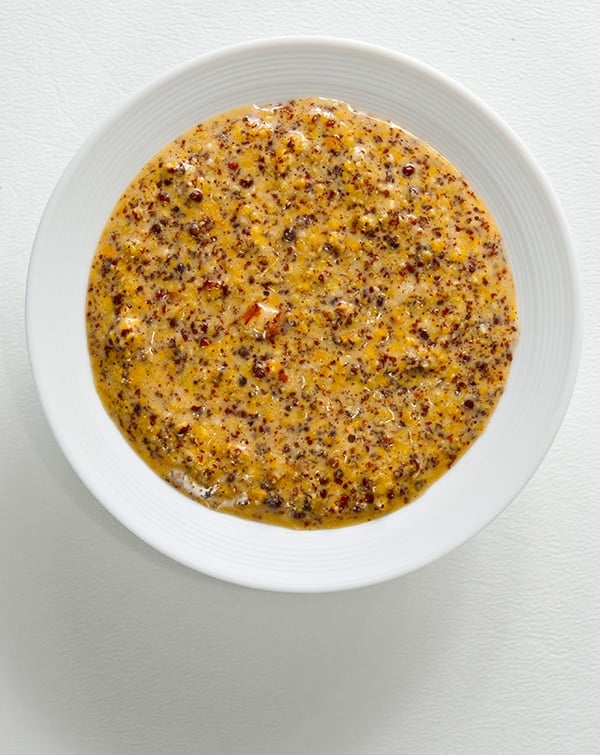
What do you mean you can make mustard at home? It was all I could do not to say, “Uh… how did you think it was made? By mustard elves under a tree?” Instead, I said, “Why yes, and it is really, really easy to make.”
I had this conversation years ago with another food blogger, and I tell you this because for even a food person to not know how to make mustard tells me that it must appear to be magic to most people. But it ain’t. If you have mustard seed and water, you can make mustard.
It’s that easy. And pretty much every culture in the Northern Hemisphere has done so: Mustard is to the North what chiles are to the tropics.
Mustard is a condiment of a thousand faces. Some are smooth, others almost entirely made from barely cracked seeds. Vinegar is often used, but wine, beer, grape must, and even fruit juices are used to moisten the seeds.
Sweetness is usually achieved by adding honey; an American “honey mustard” can be a 1:1 ratio of mustard to honey. A Bavarian sweet mustard, however, uses only sugar and water: no acid, no honey. Italians put fruit preserves in their mustard.
Mustard is one of Europe’s few native spices, although it also has been used in Chinese cooking for around 2,500 years as well. Ancient Rome was quite the hotbed of mustard-making, and it is Rome that gives us our name for mustard: It is a contraction of mustum ardens, or “hot must;” the Romans often added crushed mustard seeds to unfermented crushed grapes.
I’ve recreated a Roman recipe for mustard that uses almonds, pine nuts, mustard seed and red wine vinegar.
The basic idea behind making mustard is this: Grind seeds and add liquid. At its most basic, this is all mustard is. Both Chinese and English mustard (think Coleman’s) is nothing more than water and mustard powder. But there are some things you need to know to make great mustard.
First, you need cold liquid. What gives mustard its bite is a chemical inside the seeds reacting with cool or cold liquid. You also need to break the seeds to get at the fiery chemical — it’s like cutting an onion. Heat damages this reaction, however, so to make a hot mustard use cold water, and warm water for a more mellow mustard.
Mustard sauces lose punch when long-cooked, and should always have a little extra fresh mustard tossed in at the end of cooking.
This reaction is volatile, too. Left alone, your mustard will lose its bite in a few days, or in some cases even hours. But adding an acid, most often vinegar, sets the reaction in place — this is what happens with horseradish as well. Adding salt not only improves the flavor, but also helps preserve the mustard, too.
If you skip the vinegar and salt, you will still have mustard, but it will not keep for long. Not that it will go bad, but it will lose it’s flavor.
Once made with salt and vinegar, mustard is nearly invulnerable to deterioration. Mustard is one of the more powerful anti-microbial plants we know of, and, considering it is mixed with vinegar and salt, it becomes a heady mix no wee beastie can survive in. It is said that mustard will never go bad, although it can dry out.
You have three choices when it comes to which variety of mustard seed you use: White, brown and black. White mustard undergoes a different, milder reaction than do brown mustard or black mustard, which are far zingier. American yellow mustard is made with white mustard seed and turmeric, brown mustards are in most of your better mustards, and black mustard is used in hot mustards or in Indian cuisine.
(Note: You can tame black and brown mustard seeds by soaking them in water overnight before grinding.)
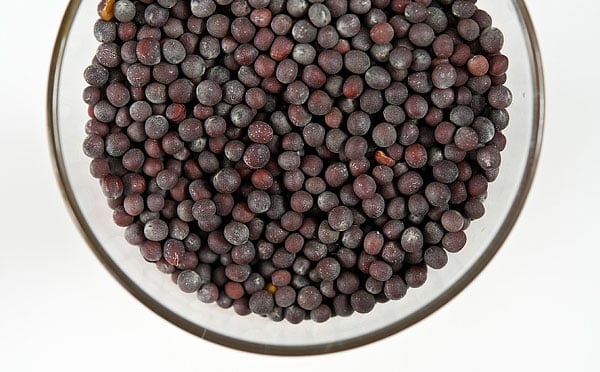
Incidentally, the wild mustard all over California is black mustard. You can thank Father Junipero Serra for that one: He used mustard, which grows like a weed, to mark his travels in Alta California 250 years ago.
The famous Grey Poupon mustard — Dijon has been a center of mustard-making for nearly a millennium now — is traditionally made with stone ground brown mustard and verjus, the tart juice of unripe grapes. I prefer this style of mustard, and most of my homemade mustards are grainy like Dijon. I grind my seeds with a spice grinder, but you could get all old school and use a mortar and pestle.
The best mustards, in my opinion, combine brown or black mustard seeds with yellow mustard powder: The two sets of chemical reactions complement each other and made a more complex mustard.
Always add water or a non-acidic liquid first, let the mixture sit for 10 minutes or so, then add the acid (vinegar, verjus, lemon juice, etc).
Add salt to taste, but it’s typically about 1 to 2 teaspoons per cup of prepared mustard.
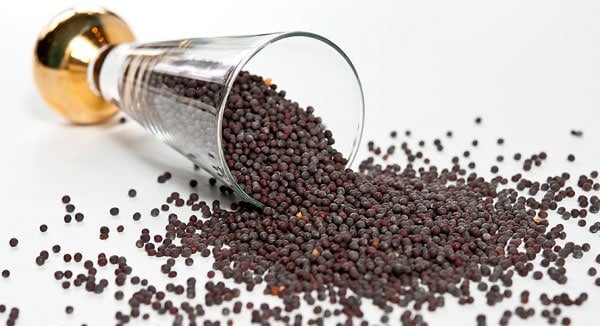
Finally, let your mustard set in the fridge or in a cool place for at least a day before you serve it. Bitterness is a byproduct of the mustard reaction, but that bitterness fades after a day or so. Pure mustards can be kept at room temperature, but mustards with other ingredients, like the Roman nut mustard I mention above, should be kept in the fridge.
So there you have it. Easy-peasy. Now you really have no reason to ever buy mustard again.
Basic Country Mustard
Ingredients
- 6 tablespoons mustard seeds, about 50 grams
- 1/2 cup mustard powder, about 50 grams
- 1/2 cup water or beer
- 3 tablespoons vinegar (cider white wine or sherry)
- 2 teaspoons salt, about 5 grams
- 1 teaspoon ground turmeric (optional)
- 2 tablespoons honey (optional)
- 1/4 cup minced fresh herbs (optional)
Instructions
- Grind the whole mustard seeds for a few seconds in a spice or coffee grinder, or by hand with a mortar and pestle. You want them mostly whole because you are using mustard powder, too.
- Pour the semi-ground seeds into a bowl and add the salt and mustard powder. If using, add one of the optional ingredients, too.
- Pour in the water or beer, then stir well. When everything is incorporated, let this sit for up to 10 minutes. The longer you let it sit, the mellower the mustard will be. When you’re ready, pour in the vinegar.
- Pour into a glass jar and store in the fridge. It will be runny at first. Don’t worry, it will thicken up overnight. Wait at least 12 hours before using. Mustard made this way will last a year in the fridge.
Video
Notes
- Change the liquid and you change the mustard.
- Grind the mustard seeds a lot or a little and you change the texture — or skip the whole seeds altogether and use just mustard powder. Or skip the powder and just use seeds.
- Want herbs in there? Go for it.
- Like honey mustard? Pour some honey in.
- Want your mustard even spicier? Add chiles or freshly grated horseradish.
Nutrition
Nutrition information is automatically calculated, so should only be used as an approximation.

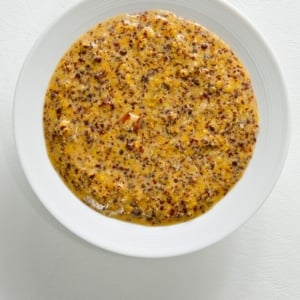
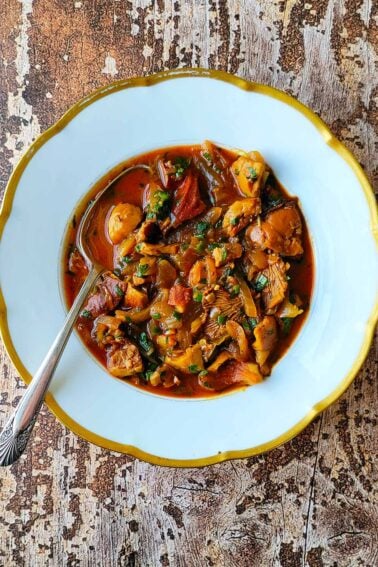
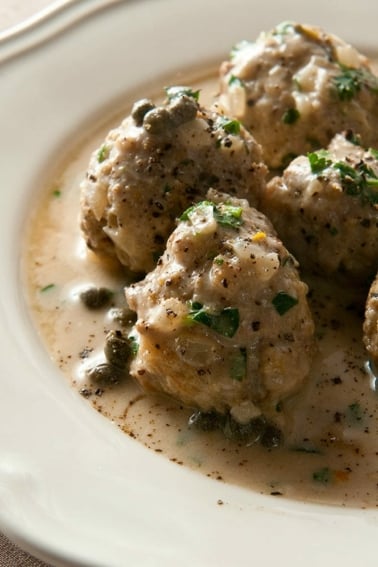
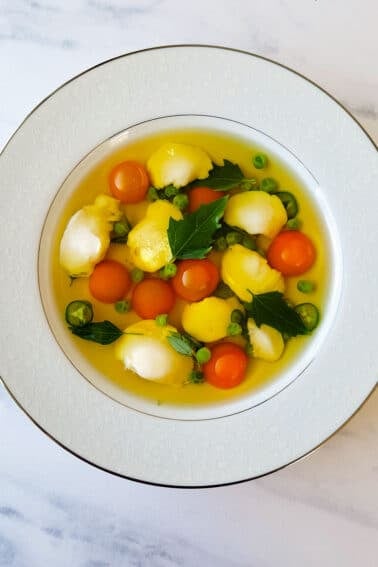
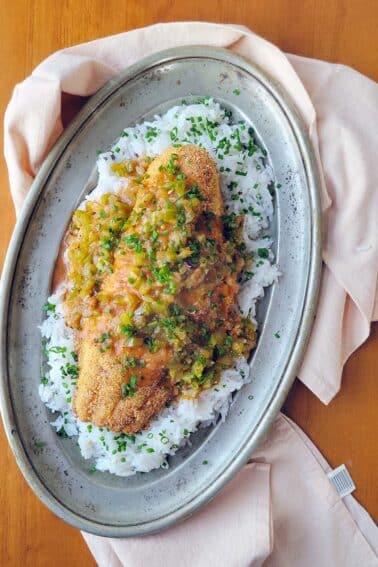
I was gifted mustard seeds to grow as micro greens but with so many, left some to grow on. I had no idea at that time that they are weeds!! Now I have to find something to do with them and thankfully you have given the answer. TY.
If I want to use all mustard seeds and no powder, should I double the about of seeds.
Debra: yes, but be sure to crack the seeds.
What do you think about using the mustard seeds I used to ferment my pickles? The jar is finished but all those seeds at the bottom, wasting them seems wrong.
Valeria: I’ve never tried that, but it might work.
This is gold-dust…. as a forager, I am always looking to rpeserve the best of the produce I bring home and have intended to make mustard for years, but never bothered.
Having recently bought some seeds (I’d have preferred to have grown them, but didn’t), this is sage advice way beyond simple “cooks” actions, many thanks.
hi, could I make this mustard and not refrigerate it as long as its not been opened? to be stored in a cupboard to be given as gifts at a later date? many thanks
Jilly: Yes, I think so.
Hello Hank,
I made this recipe and it has great flavor but it tasted very salty to me. I tried another batch and only added 1/2 teaspoon of salt and it still tastes more salty than it should taste. I looked and my mustards seeds and powder, and it has no added salt. Will the saltiness become more faint over time? Has this happened to you?
Thank you!
Andrew
Andrew: I doubt it. Sounds like you are especially sensitive to salt. Everyone is different in this way. Most people who have made this recipe liek the salt level. Maybe add just a tiny pinch next time?
Not sure what i did, yummy flavour but i couldn’t keep it in my mouth it was almost spicy and couldn’t eat it.
B Mac: It’ll calm down eventually. You can also heat it briefly — just to the steaming point — and it’ll calm down.
I recently made a fairly large batch of mustard and added too much water/vinegar. If I reduce it in a sauce pan will that have any effect on the shelf life? I assume the mustard will become more mild which is ok
Joe: Yes, it will get milder. And it should not affect the shelf life at all.
Hello Mr Shaw,
I brought yellow brown mustard seeds and am about to try your recipe but I have what may be a stupid question. Where am I getting the mustard powder from? Am I to fine grind the yellow seeds to make powder or am I supposed to go out and purchase mustard powder as well? I was hoping that these seeds was all the mustard products I needed to buy ? let me know if you can, I’ll give it a week before making to respond, if not I’ll just buy the powder ? Thanks so much for your recipe ???
Crystal: Typically I buy mustard powder, too, but you can simply buzz some of the seeds in a spice grinder, or use a mortar and pestle, to grind into a powder. Either works well.
I really enjoy making mustard at home. One thing I like is to ferment the seeds. I put a dry cup of seeds into a mason jar add water to just cover, then a teaspoon of kosher salt. I put the lid on and give it a very vigorish shake. It then its in a dark corner of my kitchen for about a month. I check it weekly to make sure their is no mold and to release any built up CO2. After than I rinse the seeds, then course or fine grind with depending on my mood and add wine vinegar and salt, and sometimes herbs like thyme, to taste.
hey you fermented , this made the flavor more mild ? yet different than solely soaked… might have to try that